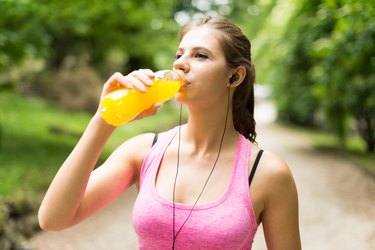
Picture this: You're at the convenience store eyeing the recovery drink refrigerator. You know you want to stay hydrated and choose the healthiest sports drink possible option but which should you choose, Powerade Zero or Gatorade G2?
Benefits of Consuming Sports Drinks
Video of the Day
Before pitting one drink against another, it's important to understand why these beverages are even a part of the conversation in the first place. As delicious as most sports drinks are, the reason that so many people flock to them is actually for their electrolyte content.
According to MedLinePlus, electrolytes are minerals in the body that are electrically-charged to help balance hydration and the body's acid/base (pH) level. They also help to move nutrients into cells, and waste out.
Video of the Day
When looking at a food nutrition label on the back of a sports drink, you'll typically find some combination of calcium, chloride, magnesium, phosphate, potassium and sodium — all of which are electrolytes. Sodium is often considered the most important electrolyte, as, according to MedLinePlus, its use directly correlates to nerve and muscle function, which means it helps to prevent cramps from happening on the field.
In order to achieve optimal muscle and nerve function (and subsequently perform your best in sports while recovering quickly from dehydration), the 2015-2020 Dietary Guidelines for Americans recommend that adults consume 2,300 milligrams of sodium per day. Most sports drink servings contain one-tenth of that recommendation, while many foods can help add to your overall daily sodium intake.
Gatorade G2 vs. Powerade Zero
Gatorade and Powerade might seem like the same beverage with slightly different flavor names, but, believe it or not, they actually do bring different things (or, rather, nutrients) to the playing field.
Let's start with Gatorade G2, the low-sugar alternative to the brand's classic Thirst Quencher. A 12-ounce bottle of cool blue G2 has 30 calories, 160 milligrams of sodium, 45 milligrams of potassium and 8 grams of carbohydrates (7 of which are sugars). Then there's Gatorade Zero which has has 10 calories per 20-ounce bottle, comprising 270 milligrams of sodium, 75 milligrams of potassium, and 1 gram of carbohydrates.
A 20-ounce serving of Powerade Zero Mountain Berry Blast, on the other hand, has 0 calories, 250 milligrams of sodium, 2 percent of the daily recommended dose of potassium, and zero carbohydrates. While it has slightly less sodium than the two low-sugar Gatorade options, given that it has fewer carbohydrates and calories overall, some would say that it's the better choice. However, the numbers are so minuscule, in this case, that it really comes down to your preference for flavor, rather than nutrient load alone.
Read More: The Benefits of Electrolytes in Water
The Zero Sugar Debate
Sugary drinks might taste great, but at the end of the day, the added sugars they contain are linked to so many illnesses and potentials for disease that many brands are launching zero-sugar and low-sugar options of their best-selling products — as is the case for both Powerade Zero and Gatorade Zero.
According to the Mayo Clinic staff, added sugars, which are sugars and syrups that make their way into food during processing, are commonly found in energy drinks, sodas, candy, and more. The 2015-2020 Dietary Guidelines recommends consuming no more than 10 percent of your daily calories in added sugars (which equates to 50 grams for a 2,000 calorie diet).
Since not everyone works within a 2,000 calorie range, the American Heart Association takes it a step further, and recommends that adult women should eat no more than 100 calories, or 25 grams of sugar, per day. Men should eat no more than 150 calories, or 38 grams.
With this in mind, switching from a regular sports drink to one that's made with no sugar can save you nearly an entire day's worth of sugar, if not more. Additionally, opting for low-sugar and sugar-free alternatives is a better option orally, as it's less likely to lead to tooth decay.
- MedLinePlus: "Fluid and Electrolyte Balance"
- MedLinePlus: "Sodium Blood Test"
- Gatorade: "Gatorade Zero"
- The Coca-Cola Co. Product Facts: "POWERADE Zero Sugar, Mixed Berry - 20 fl oz"
- Gatorade: "Gatorade G2 Thirst Quencher"
- Mayo Clinic: "Nutrition and Healthy Eating"
- American Heart Association: "Added Sugars"
- Nutritional Goals for Age-Sex Groups Based on Dietary Reference Intakes and Dietary Guidelines Recommendations